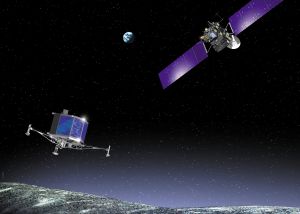 Today, scientists at the European Space Agency hailed the successful landing of their Rosetta Spacecraft’s robotic probe (named Philae), after a 10-year journey, on a comet (named 67P Churyumov-Gerasimenko), which is hurtling through space, 317 miles from Earth, at 41,000 mph: a first for mankind, and very impressive indeed.
Today, scientists at the European Space Agency hailed the successful landing of their Rosetta Spacecraft’s robotic probe (named Philae), after a 10-year journey, on a comet (named 67P Churyumov-Gerasimenko), which is hurtling through space, 317 miles from Earth, at 41,000 mph: a first for mankind, and very impressive indeed.
Given their jubilation (with high-fiving, backslapping, and hugging all around), you’d think they had in fact discovered signs of life out there … somewhere.
But I, for one, remember all too well the jubilation that attended, not just some robotic probe, but man landing on the Moon. And I am hard-pressed to cite ways in which that landing has lived up to the hype and hope it inspired.
Not to mention that I’m still recovering from all of the disillusionment man’s robotic missions to Mars caused:
I don’t get it. Curiosity only traveled where many other rovers (namely, Pathfinder, Sojourner, Spirit, and Opportunity) have gone before. And each one of them merely proved what earthbound astronomers have known for decades; namely, that our closest neighbor in Milky Way galaxy is nothing but a desolate, volcanic, uninhabitable mass. And, yes, it’s covered in red dust.
Meanwhile, scientists estimate that there are over 500 million planets in our “galactic habitable zone” alone. And there are supposedly billions of other galaxies in the universe. So why, pray tell, all the jubilation, to say nothing of the billions wasted trying to breathe life into this dead planet? And here’s a news flash folks: if NASA thought there was even the remotest chance of its rover encountering life on Mars it would not be beaming images back live for all the world to see!
(“Mars … Again?” The iPINIONS Journal, August 7, 2012)
Clearly, as I’m no rocket scientist, you might be inclined to dismiss my cynicism in this case as utterly without merit.
Except that, here is the similar note I sounded two years ago, when scientists at the European Laboratory for Particle Physics in Geneva (CERN) hailed what was arguably an even greater feat: discovery of the holy grail of science, the God particle:
Higgs boson (aka the God particle) was the theoretical missing link that explains (or should explain) the DNA – not just of our universe, but of others that might be out there…
But, frankly, not since Stephen Hawking’s A Brief History of Time: From the Big Bang to Black Holes (1988) has there been so much media hype about a subject so few people know anything about…
Therefore, whatever benefits it might lead to at some point in the distant future, I suspect this discovery will have about as much impact on our daily lives as the pre-historic discovery of Halley’s comet.
(“The God Particle? Hardly…,” The iPINIONS Journal, July 7, 2012)
And here – in a report published just days ago, making it as coincidental as it should be instructive – is the cynical note the very scientists who hailed the Higgs boson discovery back then are sounding now:
Scientists raise doubts about Higgs boson discovery; say it could be another particle. Was all the Higgs hoopla a bit premature?
In a new paper that has raised eyebrows around the world, an international team of scientists says there is no proof that the particle whose discovery was confirmed last year by physicists at CERN is the long-sought Higgs boson….
(Huffington Post, November 10, 2014)
 Therefore, I hope I can be forgiven a little vindication amidst all of today’s jubilation.
Therefore, I hope I can be forgiven a little vindication amidst all of today’s jubilation.
More to the point, though, I just think that, given the feat of landing a man on the Moon almost 50 years ago, scientists would do well to be a little more humble about feats that amount to little more than high-wire, robotic acts in space. Especially if those feats, in and of themselves, do little to advance man’s ongoing quest to either discover signs of other life in the universe, or find out more about the origins of our planet … ourselves.
Finally, for good measure, just imagine how misguided and misleading it would be if the “inhabitants” of some other planet landed a lazy chair-size probe in the middle of the Sahara Desert, and extrapolated from images it beamed back to them facts about Earth and its inhabitants….
Related commentaries:
God particle…
Mars…
* This commentary was originally published yesterday, Wednesday, at 1:19 p.m.